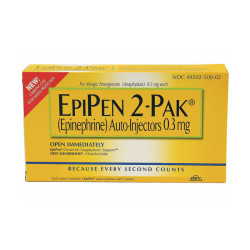Top Class Actions’s website and social media posts use affiliate links. If you make a purchase using such links, we may receive a commission, but it will not result in any additional charges to you. Please review our Affiliate Link Disclosure for more information.

The $465 million settlement wraps up a whistleblower lawsuit brought by competitor healthcare company Sanofi-Aventis and Florida pharmacy Ven-A-Care. Sanofi accused Mylan of misclassifying its product EpiPen, an epinephrine injector used to treat deadly allergic reactions, as a generic. The alleged misclassification allowed Mylan to improperly reduce the rebates it paid to the Medicare program, Sanofi claimed.
As an incentive for initiating this whistleblower lawsuit, Sanofi will receive $38.7 million of the recovered federal money plus a share of funds recovered for affected states.
The rebates at issue in this EpiPen whistleblower lawsuit are required by federal healthcare programs to avoid price gouging by pharmaceutical companies. Companies that are the sole source of a particular drug must pay higher rebates.
At the time of the alleged fraud, there was no FDA-approved equivalent to EpiPen on the market, giving Mylan exclusive control over sales of this lifesaving drug.
But according to Sanofi’s whistleblower allegations, Mylan improperly qualified itself for a lower rebate by claiming EpiPen was generic. Sanofi says it discovered the alleged underpayments in the course of developing its own epinephrine injector to compete with EpiPen.
Mylan has since released a generic version, available for sale at half the price of EpiPen.
Mylan announced in October 2016 that it had reached a whistleblower settlement agreement in principle with the U.S. Department of Justice. In addition to paying the multi-million dollar settlement amount, Mylan will enter into a Corporate Integrity Agreement to be overseen by the Office of Inspector General of the U.S. Health and Human Services.
Mylan has received ample criticism lately for implementing an enormous increase in the price of EpiPen. This drug, which is an essential life-saver for patients undergoing sudden anaphylactic shock, now costs $600 for a two-injector pack – six times what it cost less than a decade ago.
The marketing of EpiPen has also drawn private litigation. In September 2016, a private plaintiff accused the company of price gouging when it raised the price of EpiPen. Another consumer class action lawsuit claimed Mylan had violated consumer protection laws by marketing EpiPen exclusively in two-injector packs instead of making single injectors available.
Sanofi’s role as a whistleblower is a role that any business or individual may be able to take if they have evidence of fraud being perpetrated against the government. The qui tam provisions of the False Claims Act allow such a person to initiate a whistleblower lawsuit on behalf of the government.
The U.S. Department of Justice then gets a chance to investigate the allegations and possibly intervene as a plaintiff, as it did in the current EpiPen whistleblower lawsuit. If the action ultimately results in any recovery, whether by settlement or a court’s judgment, the whistleblower who initiated the action gets a share of the recovered money.
Sanofi is represented by attorneys Chan Lee, Robert M. Thomas and Suzanne Durrell.
The Mylan EpiPen Medicaid Rebates Whistleblower Lawsuit is United States ex rel. Sanofi-Aventis US v. Mylan Inc., Case No. 1:16-cv-11572, in the U.S. District Court for the District of Massachusetts.
ATTORNEY ADVERTISING
Top Class Actions is a Proud Member of the American Bar Association
LEGAL INFORMATION IS NOT LEGAL ADVICE
Top Class Actions Legal Statement
©2008 – 2024 Top Class Actions® LLC
Various Trademarks held by their respective owners
This website is not intended for viewing or usage by European Union citizens.















6 thoughts onEpiPen Whistleblower Settlement Finalized for $465M
I have purchased epipens before..due to be allergic to yellow jackets.
Please add me
Please add me to the class-action lawsuit, my epi-pens are so costly
Please add me to the class action lawsuit
I had to take my chances because I couldn’t afford them. Deathly allergic to bee stings but, could afford to buy them.
So this is why my epipens were 70 to 85 dollars for 2. I had to stop getting them because I couldn’t afford them. I had to just hope I didn’t need them. At least I was an adult and could take care of myself. I don’t know what people with kids do.